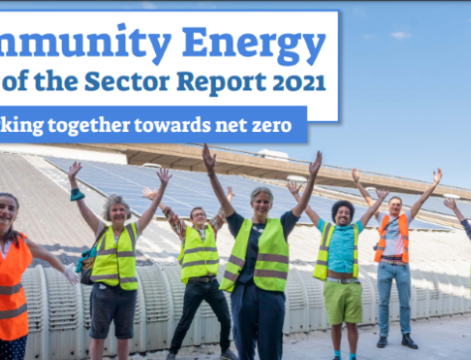
UK Community Energy - State of the Sector report
The annual Community Energy State of the Sector survey and report has been published for 2021, published by Community Energy England.
To increase the capacity for community based approaches to local renewable energy provision across Europe in order to reduce carbon emissions, increase energy security and tackle fuel poverty whilst driving ‘Green Growth’.
For this project, community energy is defined as the provision of energy infrastructure, primarily renewable energy generating infrastructure but also energy efficiency measures, led by community groups and owned wholly or partly by local communities typically through the issue of community shares, using local supply chains and providing local employment opportunities, motivated by the objectives of environmental improvement and keeping the value of energy generation within the local population rather than it going to large national and multinational corporations. Although one key aspect of community energy is local community ownership of projects, this does not mean that finance for every development stage of a community energy project is easy to come by, or that the state should not support such projects either through direct or indirect means (grants, loans, expertise or market mechanisms).
Currently state interventions are skewed towards support of large corporations which offer poor value to local communities, keeping it at a corporate level. The project seeks to increase investment in local community energy investment via support from Structural Fund and ETC programmes. Integrated regional low-carbon strategies need to focus more on community energy investments to reach these targets, but there is currently significant disparity across the member territories in this policy area: where some have none at all, those who do vary substantially in the levels of interventions and stakeholders that they favour and therefore their outcomes, in particular in the share of renewable energy infrastructure owned by communities and supported through the relevant structural fund programmes. COALESSCE aims to address this disparity.
€1,570,059.00
Low-carbon economy
The Greater Manchester Strategy, Stronger Together, is the sustainable community strategy for the Greater Manchester city region. Our vision for Greater Manchester is that by 2020, the city region will have pioneered a new model for sustainable economic growth based around a more connected, talented and greener city region, where all our residents are able to contribute to and benefit from sustained prosperity and a good quality of life. The gms aims to develop Greater Manchester as a ‘low carbon economy to achieve the target of reducing our carbon emissions by 48% by 2020 (from 1990 levels). It highlights work to improve the energy performance of new and existing buildings, businesses and households and support growth in Greater Manchester’s low carbon goods and services sector. We will also ensure that the city region is resilient to the changes in our climate and support low carbon projects and programmes. The opportunities from Community enrgy development .
Environment and Risk Prevention (Priority 2): Sub-theme : Energy and sustainable transport (moving to a low carbon economy, including information to industrial customers, service providers and citizens on issues such as “how to reduce energy consumption”/exchanging and transferring of knowledge on mechanisms to stimulate investment in production of renewable energy as well as in energy efficiency projects):
Territorial and Settlement Development Operational Programme of Hungary (abbreviation in Hungarian: TOP) co-financed through Structural Funds encourages the implementation of sustainable and inclusive growth objectives of EU2020 Strategy. TOP measures focuses on jobs, sustainable energy management, climate change, and fight against poverty and social exclusion. Based on its thematic objectives, TOP fosters decentralized economic development programmes focusing on special territorial needs. Priority axis 3 of TOP ‘Transition to a low-carbon economy with particular focus in urban areas’ in line with TO 4 assigns measures to mitigate climate change effects at urban level. TOP 3.2. Unique objective focuses on activities of local municipalities to improve their energy efficiency and increase the share of energy from renewable sources (i.e. retrofitting of municipality owned buildings, preparation of SEAPs, complex programs focusing on exploitation and usage of locally available renewable sources). It needs to be improved, because TOP 3.2. includes increasing the share of RES in local governments, but it does not name community energy. Community energy is not so widespread, and only few examples exist in Hajdú-Bihar. In line with energy investment projects energy awareness trainings should be organized addressing target groups of TOP 3.2 activities (employees of institutions, users of facilities).
The policy instrument addressed by us has as a purpose supporting the regional community through the funding of dedicated actions and projects in energy field. Despite the fact that County Councils implementing existing policy are considered as main actors in developing county strategies covering economic, social and environmental issues in cooperation with local authorities and stakeholders, there is no clear strategy yet at regional level. Mostly the Region deals with national legislation and policy implementation together with dissemination activities. The cause can be identified in the complex legal and administrative framework, the frequent changes in politics and legislations, the unclear application of national and European funds, the lack of experienced personnel and the financial crisis. Failure to operate in this way means that oppoortunities for investment, SME intervention and job creation are lost. This project will help us to change this situation by bringing together key strategy developers to look at best practice elsewhere in the EU.
1.The Protocol concerns the implementation of a program for the promotion of biomass in the Region of Abruzzo. It focuses on the creation of a complete supply chains for the exploitation of agro-forestry biomass and residual in the Abruzzo region: the collection, processing, distribution, marketing, use, end-use, incineration at dedicated plants. 2. ERDF Structural funds 2014 – 2020 – the axis mentioned in previous section focuses on the following priorities: promotion of energy efficiency and reduction of energy consumption and emissions in both private and public buildings / sectors, smart buildings, promotion and integration of renewables, financial incentives for energy efficiency and savings, promotion of sustainable mobility in urban areas, new urban and rural low impact fleets.
The OPRG 2014-2020 is part of the implementation of the EU structural and investment funds (ESIF) in Bulgaria under the objectives for Growth and Jobs. This project addresses PA 2: Support for Energy Efficiency in support centers in peripheral areas, Investment priority 2.1.:Supporting energy efficiency, smart energy management and renewable energy use in public infrastructures, including in public buildings, and in the housing sector. The Specific Objective under the investment priority is raising energy efficiency in the housing sector in the support centres of 4th level of the national system. The planned activities will result in improvement of energy efficiency of buildings in the target territories, which will contribute directly to lowering the end energy consumption, and indirectly, to reducing greenhouse emissions in the small cities – support centres of the polycentric system in accordance with the NSDC 2013-2025. The interventions under this priority axis are intended to contribute to the achievement of the national indicative energy savings targets for 2020 set in the National Action Plan for Energy Efficiency 2014 – 2020. The improvement of the housing stock in small cities and commissioning of installations for production of energy from renewable energy sources for the buildings will reflect in better air quality and and will improve the living conditions in those cities and will meet their own energy consumption needs where this is economicaly feasible.
The Integrated Energy and Climate Protection Concept was decided in July 2014. Priority Axis 1: Increasing the part of regional added value within the energy sector. Thematic Objective and Investment Priority: The restructuring of the energy sector including a decentralisation of the electricity generation will improve the added value at regional, municipal and company level. Specific Objective 1: COALLESCE aims to increase the capacity for community based approaches to local renewable energy provision across Europe in order to reduce carbon emissions, increase energy security and tackle fuel poverty. Specific Objective 2: We will motivate communities to keep the value of energy generation within the local population rather than it going to large national and multinational corporations. In Baden-Württemberg already exist some hopefully community based energy projects, but they have to be extended. In addition, the national renewable energy law focus more on procurement procedures and direct marketing of electricity from renewable energies, thus the framework conditions for communities are more difficult in this area now. Therefore we will also address energy efficiency projects implemented by community groups.

The annual Community Energy State of the Sector survey and report has been published for 2021, published by Community Energy England.
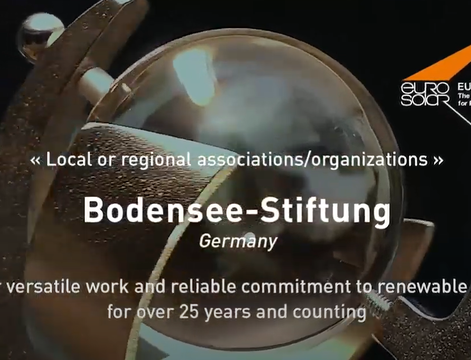
Coalescce project partner, Lake Constance Foundation, was awarded the European Solar Prize 2020 for its tireless work over 25 years.
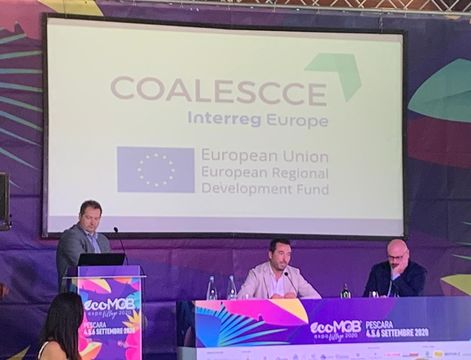
ECOMOB has been held in Pescara on 4th-6th September 2020 and is the only expo dedicated to eco-sustainable culture in central-southern Italy.
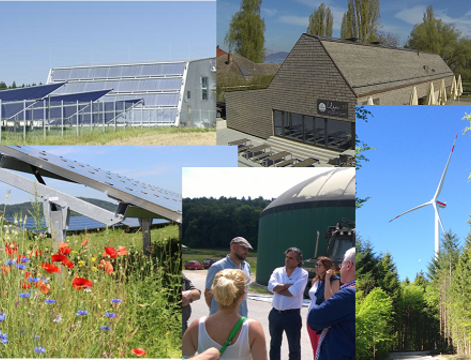
Colleagues and stakeholders will be on the panel at the Webinar on Biogas from waste webinar

The EU have launched there ambitious New Green New Deal Strategy that will guide how future EU funding will be spent.
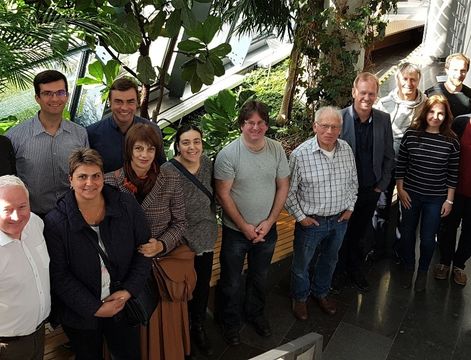
The Coalescce project launches the Community Energy Toolkit
An article from the English newspaper The Guardian on how Barcelona and Cadiz in Spain are pursuing community energy supply
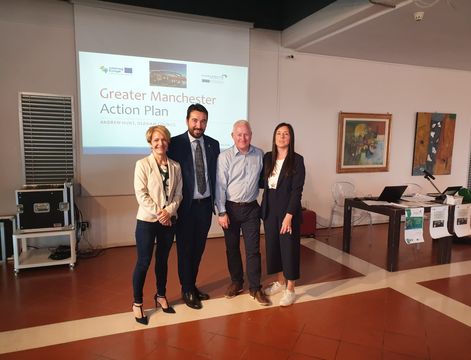
Meeting opened by The Abruzzo Regional Councillor for Energy
COALESCCE members, the Lake Constance Foundation, participated at a special event at Germany’s Zeppelin University earlier this month.
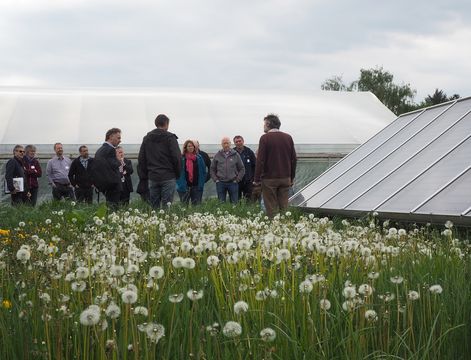
Around 30 people attended the first COALESCCE workshop in Lake Constance, Germany.